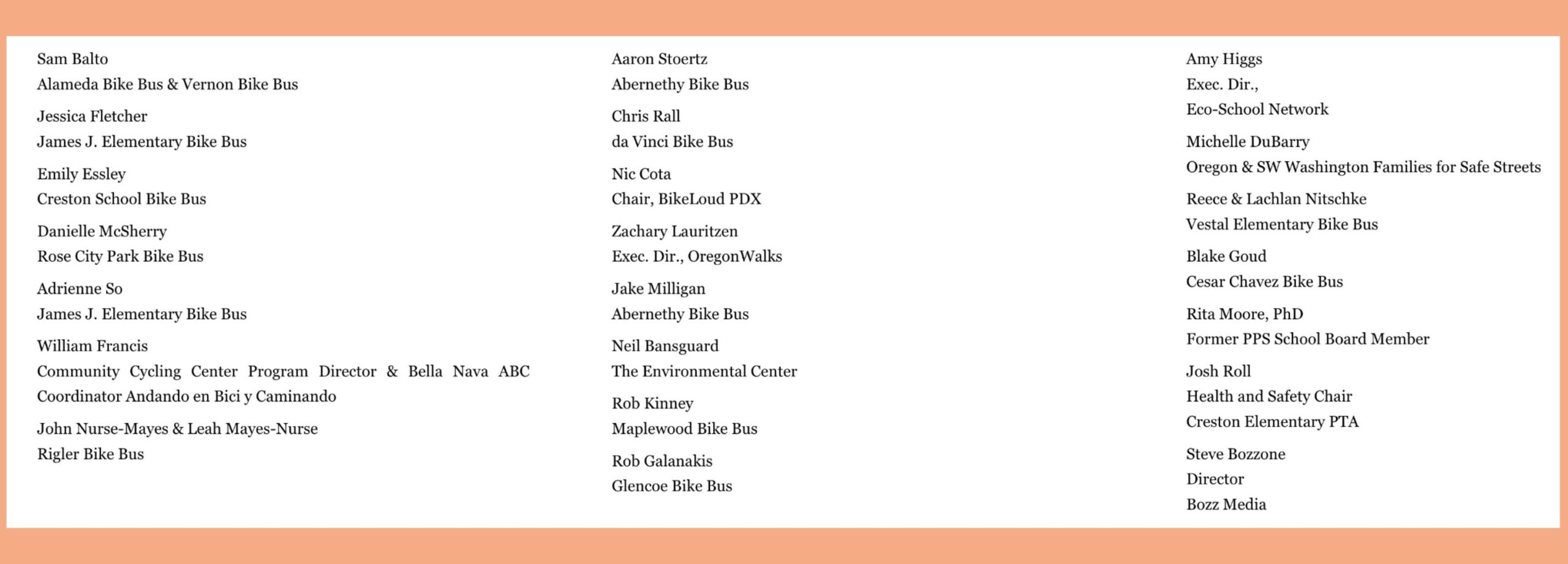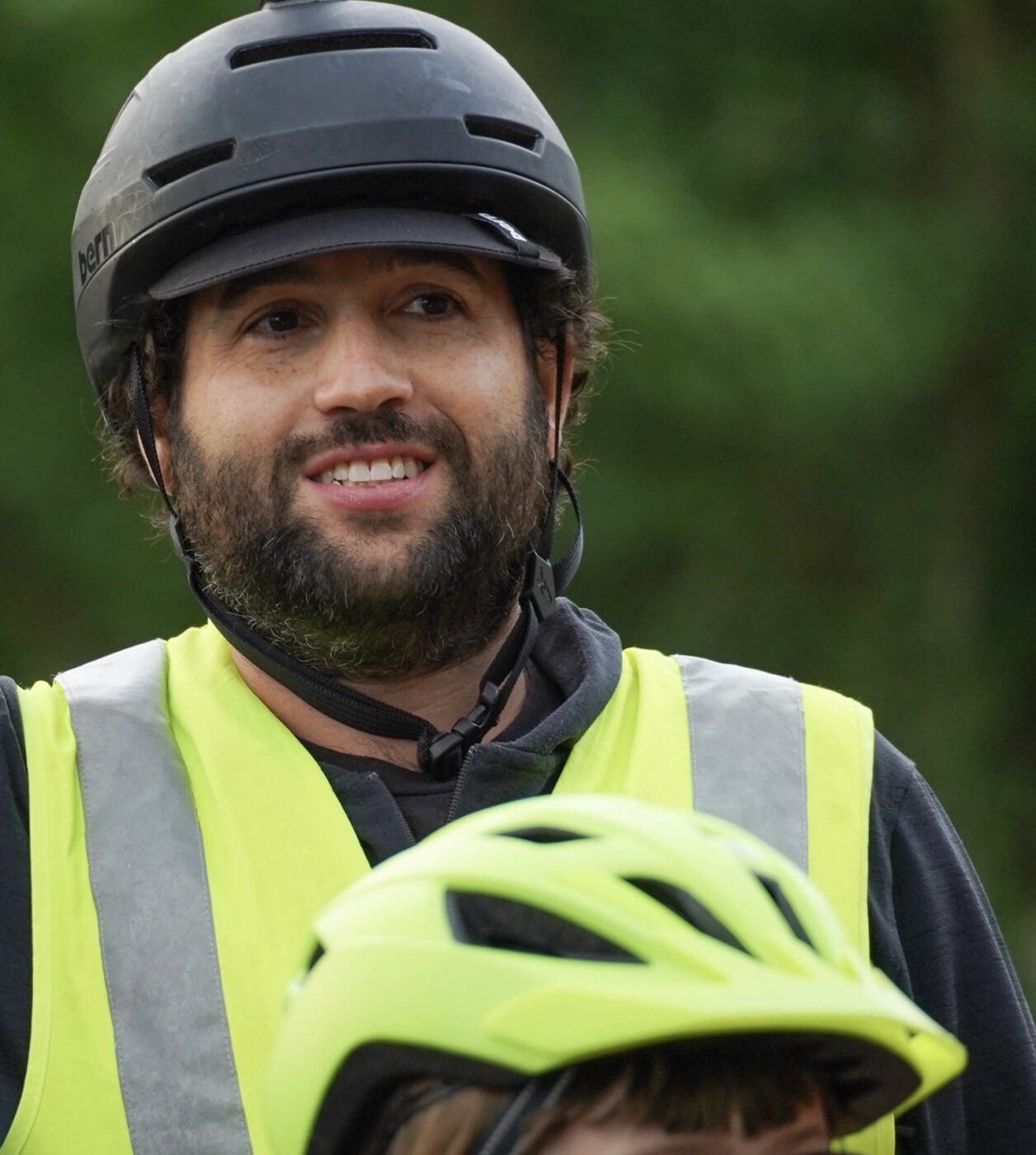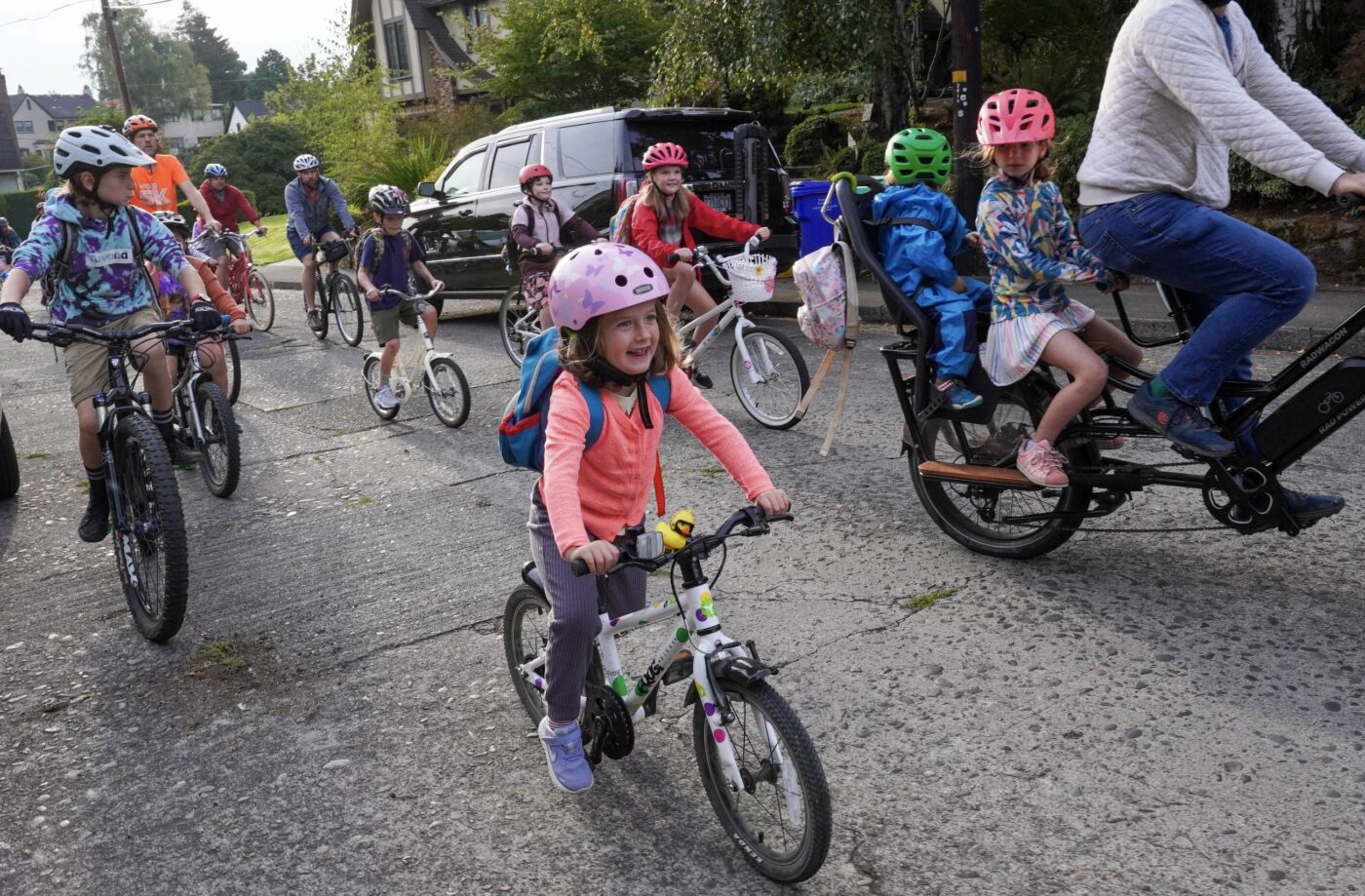Fresh off a year of remarkable growth, local bike bus advocates have wasted no time leading their corps into the new school year. The famous Alameda Bike Bus was bursting with bicyclists on Wednesday, the official first day of classes for Portland Public School (PPS) district.
But while over a dozen bike buses flourish across Portland, they’ll have to look somewhere besides PPS to fund bike bus organizers and other related expenses. That’s because — despite passage of a new state law that allows schools to be reimbursed for active transportation expenses (like bus buses, walking school buses, crossing guards, and so on) — PPS says they have no plans to end their current practice of spending their entire share of state school transportation funding on TriMet passes.
Undeterred, a growing coalition of bike bus advocates has taken their efforts directly to Portland City Hall and the transportation bureau.

Buoyed by growth and success over the past year-and-a-half, what started at one school in northeast Portland is now a bona fide, citywide movement. A new website launched this week at BikeBusPDX.org includes an open letter to leaders and elected officials signed by leaders of 13 bike buses (see above). The letter demands implementation of several projects aimed at making school bike commute routes safer.
The letter, sent to Portland Bureau of Transportation Commissioner Mingus Mapps and PBOT Director Millicent Williams and cc’d to Mayor Ted Wheeler and the rest of council, calls for a “Safer School Streets Pilot” program that would “contribute to the overall sustainability and livability of our city by reducing traffic, carbon emissions, and promoting community connections.” Here’s what the pilot would include:
- Placing permanent diverters (concrete planters) at the locations established during PBOT’s “Slow Streets” pilot, which prioritized equity across neighborhoods (see map).
- Lowering the maximum threshold for Neighborhood Greenways (NG) to 500 vehicles/day rather than the current maximum of 2,000 vehicles/day (Source: Neighborhood Greenway Assessment Report).
- Reducing speeds on Neighborhood Greenways and Safe Routes to Schools (SRTS) to 15 MPH, where feasible; placing Advisory “15 MPH / Shared Street” signs on remaining NGs/SRTS.
- Establishing a clear process for “School Street” permits to allow streets in front of and surrounding schools to be closed to vehicle traffic during drop-off and pick-up hours.
- Placing “No Turn on Red” signs at all signals intersecting Neighborhood Greenways/SRTS.
- Installing “curb extensions” with planters and paint on Neighborhood Greenways/SRTS to reduce crossing distances and improve sightlines for students and parents.
- Adding fixed speed cameras on High Crash Corridors (e.g. 82nd Ave) adjacent to schools.
- Funding a $75,000 grant for Portland State University’s TREC program to measure the impact of Bike Bus and Walking School buses on student’s physical activity, learning outcomes, and transportation pollution*. (*PSU tells me they have already initiated a research study that will focus on kids’ and parents’ perception of bike buses, a bike bus inventory, and more.)

“If PBOT can come up with $2.7 million for parking security, they can come up with a fraction of that to improve safety for children and families walking and biking to schools, libraries, parks and local businesses.”
– Sam Balto, Alameda Elementary School bike bus organizer
Alameda Bike Bus leader and PPS physical education teacher Sam Balto is spearheading the effort. Balto says he and other bike bus advocates had a “very productive” meeting with Commissioner Mapps last week.
“PBOT and PPS want more children and families walking and biking to school,” Balto shared in an email to BikePortland yesterday. “To do that we need to improve our city’s hardware and software. The passing of the Bike Bus Bill this year is the software of the social infrastructure to pay for active transportation initiatives like walking school buses and bike buses. Now we need PBOT to provide the hardware, the physical infrastructure to keep us safe from cars in the streets.”
Balto also says that if, “PBOT can come up with $2.7 million for parking security, they can come up with a fraction of that to improve safety for children and families walking and biking to schools, libraries, parks and local businesses.”
Balto used a tiny $500 grant from Metro to start his bike bus at Alameda Elementary School — an effort that increased the number of students biking to school from 1% to over one-third of students in just three months.
“We don’t expect the [bike bus] bill to really have an impact on us.”
– Valerie Feder, Portland Public Schools
A more significant funding and infrastructure boost from City Hall via PBOT could have a dramatic, positive impact on the number of Portlanders willing to bike to school, Balto says. And the City of Portland has adopted many policies to justify action on this issue — from plans to battle climate change, to a Comprehensive Plan with a goal to “make bicycling more attractive than driving for trips of three miles or less.” In a new Safe Routes to School Strategic Plan soon to be released by PBOT, they cite survey data that showed, “families who thought their school supported walking, biking and rolling were more likely to travel by one of those modes on their commute to school.”
When it comes to the role PPS might play in expanding bike buses district-wide, they say the passage of HB 3014 (the “bike bus bill”) won’t impact their 86 schools. PPS spokesperson Valerie Feder told BikePortland that’s because they already spend their entire 5% allotment from the state’s school transportation fund on TriMet passes. “We asked for the exemption to protect our current arrangement with TriMet,” Feder shared with us. “We hope the legislature will continue to build on this policy and expand opportunities for students to use active transportation and explore more ways to fund it.”
So for now, PPS staffers who dreamed of state funding for bike buses and related activities will have to wait. That will put more onus onto parent volunteers and should add even more urgency for the City of Portland to create streets that are so safe and welcoming that riding bikes to school is simply irresistible.
— For more on bike buses in Portland, read this new story in the fall 2023 issue of Portland Monthly Magazine.



